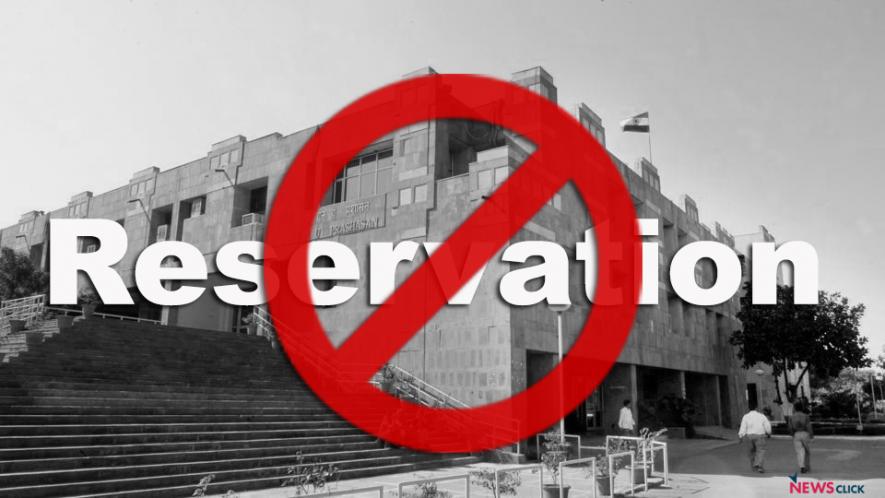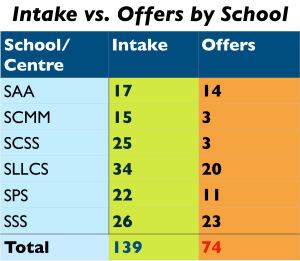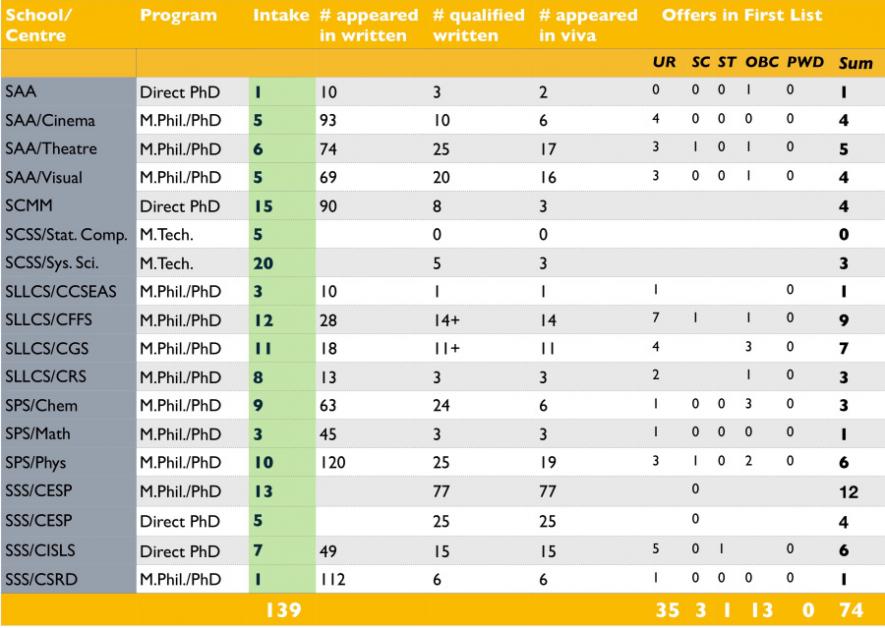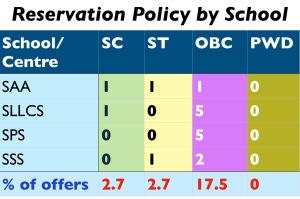JNU Debacle: Only 53% of Seats Filled, Total Collapse of Reservations in Admissions

Newsclick Image by Sumit Kumar
In yet another, shocking move by the JNU Administration, only 75 students were admitted to MPhil/PhD programmes in 2017-18 even as 194 seats had been sanctioned for the year.

This shortfall in offered seats was not because of a paucity of applications. In each Centre/School for which information is available, there were enough applications. In most cases, there were enough candidates called for the viva-voce, all of whom would have got over 50% in the written examination (which is the eligibility requirement). Yet, only 53% of the seats specified in the intake has been offered. Moreover, each and every programme, barring two (which had one seat each), has registered a shortfall when compared to the seats announced in the e-prospectus.

Additionally, there has been a complete failure to satisfy the Constitutional provisions for reservations and the Central Educational Institutions (CEI) Act, just at the stage of offers alone. Only 3 SCs, 2 ST, and 13 OBC candidates have been offered admission. It is highly unlikely that either the numbers or the overall percentage for reservation will improve significantly once the complete data is available, as the number of seats left to be accounted for are less than a hundred.

The Central Educational Institutions (Reservations in Admissions) Act 2006, and the UGC regulation on minimum standards and procedure for admission of MPhil and PhD degrees have been violated by the JNU administration.
The 2006 Act mandated OBC reservations in central higher educational institutions. The Government of India had decided to increase the intake in all teaching programmes by 54% so that admission numbers in the general category were not affected. The Act says that the number of seats has to be fixed as on the date of the coming into force of the Act and cannot be reduced thereafter unless the revised intake is approved by Parliament. But the intake in the MPhil/PhD programme in JNU was reduced from 1086 to 102 seats in 2017-18.
JNU students and teachers have long been protesting the UGC gazette notification that came out on May 5, 2016. The UGC notification provided a blueprint for curtailing JNU’s M.Phil./Ph.D. research programmes and the inclusive admission policy that evolved over several generations of students struggle.
The UGC notification which the Vice-Chancellor Mamidala Jagadesh Kumar, abruptly invoked had the following impositions and implications.
- It said that the MPhil/PhD admission should be 100% Viva-based and also undermined JNU’s deprivation points in admissions.
This has inevitably altered JNU’s entire admission policy.
The Prof. Abdul Nafey committee was constituted after JNUSU’s struggle. It came to a conclusion based on the analysis of the admission related data, that discrimination based on caste and ‘social group’ is a reality. Hence, it recommended that the viva marks be reduced from ‘30% to 15%’ to mitigate this discrimination. But the new imposition pushes towards 100% viva-based admission process with the written examination reduced to a mere qualifier. Instead of approving the Nafey Committee recommendations, the VC pushed for 100% viva based admissions, which opens the door for even more discrimination.
- The existing eligibility marks (of the last qualifying exam) for applying to MPhil/PhD in different centres of JNU vary from 45% to 55%, in keeping with the terms of the diversity of JNU’s academics. The UGC notification dictates a blanket 55% criteria in the last qualifying exam for all subjects.
- The decision to set a 50% cut-off marks in the entrance examination has resulted in a massive reduction of the pool of candidates for selection. The implementation of such rigid straight-jacketed criteria will deny thousands of students the opportunity to even apply for JNU’s MPhil/PhD programmes, students from deprived sections would face the largest casualty.
- In order to be called for the viva voce for M.Phil. Admissions, earlier students needed minimum marks of 35% for unreserved categories, 31.5% for OBCs and 25% for SC/ST/PH out of 70 in the written exam. According to the present UGC circular, all students have to obtain a minimum of 50% marks in the written exam, with no mention of relaxation to students from deprived backgrounds.
- In the current admission system of JNU, the marks of the written and the viva are added to get the final scores. Hence, the deprivation points can be added to the written marks. However, in the new scheme of things, the marks of the 2 components will be considered independently.
“This move directly affected the progressive deprivation point system followed by the university. It is safe to conclude, given the final numbers, that hardly any SC, ST, OBC candidates made it to the viva. The ones that did undoubtedly suffered further from the completely unwarranted decision to abandon the deprivation points system for research admissions, as even the award of these small numbers of marks could have helped.
Science schools in JNU appear to be the worst hit. This is not only true for the reasons noted above but because the VC’s admission policy actually did the greatest violence to the scientific research programmes, even as it appeared as if they were the least affected in terms of seat cuts. The facts that M.Sc. holders were declared ineligible for admission to PhD programmes, that the MTech/PhD integrated programme was scrapped, confusions created by several changes in programme codes, have all contributed to this sharp fall in seats, said the press release by the JNU Teachers’ Association.
The JNU teachers point out that the faculty members of the university have never complained of being ‘overburdened’ with ‘excess research scholars’; on the contrary, they have forcefully opposed the UGC notification – yet the VC is using the UGC notification to impose a straightjacket formula disregarding the specific needs and potential of JNU. Instead of expanding the faculty strength and implementing reservations in faculty selection, the VC proposes to cut down the number of researchers.
This partial data from the truncated admissions of 2017-18 shows that the critiques the JNU community has made of the 50% qualifying mark, the 100% viva, and the removal of deprivation points are on the mark and are equally important as a discussion of how to determine intake. If JNU’s research character and the breadth and variety of its research are to be maintained, none of these provisions can be part of JNU’s admission policy.
Get the latest reports & analysis with people's perspective on Protests, movements & deep analytical videos, discussions of the current affairs in your Telegram app. Subscribe to NewsClick's Telegram channel & get Real-Time updates on stories, as they get published on our website.
























